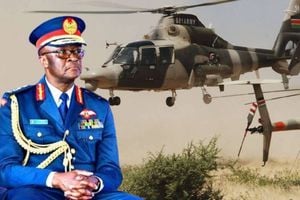Humanitarian crisis in South Sudan worsens: NGO

Displaced South Sudanese women walk towards the United Nations Mission in South Sudan base in Malakal in a past photo. The current humanitarian crisis is worsening.
The situation in South Sudan is worsening, potentially reversing gains in stability made after the 2018 peace deal, a charity has said.
CARE International warned that escalating violence in South Sudan could add to the toll already taken by disease outbreaks in the country.
The country is grappling with a worsening cholera outbreak, while famine looms. The organisation warned that further escalation of the conflict would disproportionately affect South Sudanese women and girls, who are already bearing the brunt of the suffering.
“The escalating tensions are worsening conditions for already vulnerable communities and threaten to set back progress for women and girls in the country. Gains achieved since the 2018 peace deal risk being eroded, leaving women and girls more vulnerable to violence, displacement, and loss of livelihoods. All parties must prioritise women's protection and meaningful inclusion in their efforts to restore peace and stability," said Abel Whande, CARE South Sudan Country Director.
CARE revealed that recent clashes have displaced around 100,000 people in Upper Nile State, forcing many to seek refuge in Ethiopia's Gambella region.
“At the same time, more than 1 million refugees and returnees needing urgent shelter and lifesaving support have returned from Sudan, fleeing the violence and degradation also happening there.
“Humanitarian organisations face mounting challenges in delivering aid, as insecurity hampers access to affected areas. The international community must urgently support efforts to ensure safe and unimpeded access for humanitarian workers to provide life-saving assistance,” the organisation said.
According to CARE, more than one million people in South Sudan have been affected by the cholera outbreak. As of April 2, the disease has claimed 799 lives, with more than 40,000 confirmed cases reported across 40 counties in nine states.
Between April and July this year, food shortages are expected to worsen, with an estimated 7.7 million people in South Sudan struggling to access enough food. Of these, more than 2.5 million are at risk of severe hunger and 63,000 are at risk of starvation.
South Sudan also faces a severe funding shortfall, with only 10.5 percent of the humanitarian response plan currently funded. The country needs at least $1 billion this year.
South Sudan has recently experienced escalating tensions, with violent clashes and political turmoil. In early March, confrontations between the South Sudan People's Defence Forces (SSPDF) and the White Army militia intensified, particularly after the government attempted to replace long-serving troops with new recruits.
This move was met with resistance from local armed groups, who feared targeted attacks or forced disarmament. The situation deteriorated further when the White Army seized Nasir, a strategic town near the Ethiopian border, leading to tragic incidents including the attack on a UN helicopter and the execution of SSPDF Commander General Majur Dak.
The political landscape has become even more volatile following the arrest of key opposition figures. The National Minister for Peace-Building, Mr Stephen Par Kuol, was unlawfully detained by the National Security Service, but was later released. However, the Minister of Petroleum, Puot Kang, and the Deputy Chief of Staff of the SSPDF, General Duom Lap, remain in detention.
In addition, President Salva Kiir's dismissal of SPLM-IO and South Sudan Opposition Alliance governors in Upper Nile and Jonglei states without consultation was perceived as a breach of the power-sharing agreement, further exacerbating tensions.
In response, regional and international bodies have stepped up diplomatic efforts to prevent a relapse into civil war.





